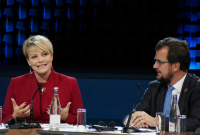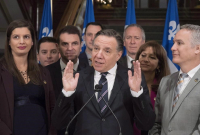Support strong Canadian climate journalism for 2025
If current polling projections hold, Canadians could be reintroduced to a political reality in Quebec not seen since the late 1960s — a party other than the federalist Liberals or the sovereigntist Parti Quebecois running the province.
With the Oct. 1 election now six months away, Francois Legault's nationalist Coalition Avenir Quebec is riding high in public opinion polls.
Recent surveys have suggested the Coalition would have formed a minority government or obtained a slim majority if the election had been held when they were conducted.
The Liberals have been in power since 2003, aside from a brief PQ minority government between 2012 and 2014, and their major fear is voter fatigue with their brand.
Jean-Francois Lisee's PQ, currently in third place in the polls, is struggling to get attention and has positioned itself as the big-government mainstream choice in a province already known for its public-spending largesse.
Taking current polling at face value can be misleading, however, because the Liberals' spring budget has proven popular, the PQ cannot be entirely counted out, and recent events have indicated the Coalition is vulnerable with its strong nationalist rhetoric.
Philippe Couillard's Liberals have entered spring on a high note after tabling a fourth consecutive balanced budget — one that cuts business taxes and aims to aggressively pay down the province's high debt.
"We did exactly what we said we were going to do," Couillard said recently about his party's 2014 campaign promises.
The Liberals are well on their way to reaching their 2014 target of helping to create 250,000 jobs over five years, and unemployment is at record lows.
In question period a day after the budget was tabled, Couillard offered a taste of how he will sell his party to electors come the fall campaign.
"Now we have the means to dream," he said, referring to the surpluses Quebec is generating after budgetary compressions early in his mandate.
"And not just to dream, but to realize these dreams due to the financial means we now have."
The PQ's Lisee also offered a slice of how his party will be campaigning in the fall.
During the same exchange in the legislature, Lisee used the term "human misery" several times to describe the consequences of the Liberals' drive to balance the books.
He brought up a Quebec ombudsman report that cited how a woman who needed home care "was forced to choose between sleeping in her wheelchair or getting (subsidized) help to eat.
"Was there any point in time when (Couillard) realized the human misery he was creating?" Lisee asked.
Philippe Fournier, an astrophysicist who runs the poll-aggregating blog Qc125.com, calls the PQ's vote "efficient."
The party's support is spread out among the ridings, creating a double-edged sword, he said.
"If the PQ drops in the polls by two or three percentage points, to 19 per cent, then they could get five or six seats and be almost wiped out," Fournier explained.
"But if their vote reaches 25 per cent, they could come away with 30 seats or more — it's a very fine line."
There are 125 seats in the Quebec legislature.
Legault's Coalition has been coasting for months on the fact his party is offering Quebecers a departure from the Liberal-PQ dichotomy of the past 50 years.
His party hasn't announced many concrete proposals yet, but Legault talks favourably of private business, cutting taxes, slimming down the public service and getting Quebec off equalization payments from wealthier provinces.
But Legault also has more controversial positions, such as reducing the yearly number of immigrants to the province by 10,000 people — at a time when Quebec is suffering from labour shortages — and making their residency contingent on passing a language test.
Finance Minister Carlos Leitao also gave voters a strong signal of how ugly the upcoming fall campaign will be when he accused the Coalition in mid-March of "ethnic-based nationalism," sparking furor in Legault's camp.
While much is up in the air, the Liberals might want to look to the recent Montreal municipal election for pointers.
Similarly to Couillard, Denis Coderre was running last November against a popular party that had never held the mayoralty. The city's economy was red-hot with low unemployment, record tourism and an explosion of urban development.
Yet Coderre lost quite heavily and was accused of running a campaign where he coasted on his record and offered nothing for Montrealers to dream about.
"I've spoken to many Liberals and they saw what happened to Coderre and they won't do that," Fournier said. "They won't run on their record — that would be a huge mistake."
But it's currently difficult, he said, "to see exactly which of the three main parties Quebecers will want to dream for."





Comments